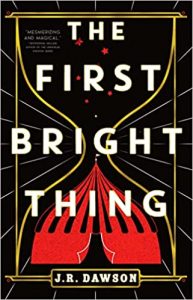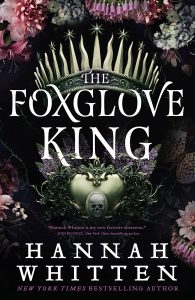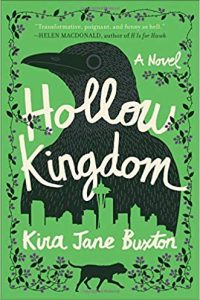Archita Mittra Reviews The First Bright Thing by J.R. Dawson and The Foxglove King by Hannah Whitten
 The First Bright Thing, J.R. Dawson (Tor 978-1-25080-554-6, 352pp, $27.99, hc) June 2023.
The First Bright Thing, J.R. Dawson (Tor 978-1-25080-554-6, 352pp, $27.99, hc) June 2023.
The First Bright Thing by J.R. Dawson is crafted on an enchanting premise – a magical circus that can move through space as well as time, powered by people with special abilities called “Sparks.” The chief players are Rin, the Ringmaster who can bend time and space to her will; her wife, Odette, a healer; and Mauve, who can peer into the future. Together this found family, aided by others, form “Windy Van Hooten’s Circus of Fantasticals,” bringing hope and joy to people’s lives. Though there are frequent time-jumps back and forth, much of the story unfolds across America in 1926, where the troupe try to make a positive difference in the aftermath of the First World War, even as the world prepares for deadlier combats.
The opening chapter reads like something out of Georges Méliès’s darkly fantastical imagination, reminding me of the beginning of Erin Morgenstern’s The Night Circus, but Dawson’s novel doesn’t dwell on the wonders of the time-traveling circus for long. Instead, Rin and her loyal band of misfits are always on the run, pursued by her former husband, the villainous Edward, who runs a rival circus that revels in mankind’s worst fears and nightmares. The chapters switch between Rin’s present and her past – the latter is narrated from Edward’s point of view. He cuts a chilling Killgrave-like figure, whose spark enables him to manipulate others for his own ends with the power of speech, and who remains pathologically fixated on Rin for years.
As a time-travel novel, The First Bright Thing is heavily concerned with questions of agency and obligation, without providing any rigid answers. The characters have frequent glimpses into 1945 – a world torn by warfare – but they realize that they cannot change the future so easily, or without upending their present. Rin learns that she cannot save all the people she loves, but that doesn’t stop her from trying, again and again. At one point, determined to set a better example, she welcomes the runaway teens, Jo and her brother to her circus. Jo believes that only by showing the audience the terrible visions of the holocaust can one prevent the future, while Rin’s troupe members prefer to foster hope and wonder. Thus, when an embittered Jo runs off to join Edward’s circus, Rin must give up everything including her own autonomy to save the young girl. The novel tries to straddle both its grimdark and the cozy fantasy trappings, but it’s the latter that ultimately gives way.
Charming, effervescent, and emotional, the book is a page-turner, probing into the long-term effects of trauma and the power of community healing.The First Bright Thing is many things at once – a historical war novel, a time travel story, an account of surviving and healing from domestic abuse, a tale of found family and community – and some of these aspects (such as the wholesome scenes of circus life or Rin’s Jewish background) are more fully developed than the others (like the World Wars, which merely provide the scaffolding for the story). I enjoyed the author’s spin on outcasts and misfits banding together to form a circus, although I’d have liked more of the period aesthetics as well as wider applications of their mysterious superpowers. Where the narrative truly shines is in its explication of toxic relationships and the invisible scars carried by survivors.
At its core, The First Bright Thing is an entertaining and heartwarming ride, populated by memorable characters and their topsy-turvy adventures, that asserts that your true family will always have your back.
 The Foxglove King, Hannah Whitten (Orbit 978-03-1643-499-7, $29.00, 480pp, hc) March 2023.
The Foxglove King, Hannah Whitten (Orbit 978-03-1643-499-7, $29.00, 480pp, hc) March 2023.
Hannah Whitten’s third novel, The Foxglove King, is a decadent dark fantasy dealing with a romantic triangle, political conspiracies, and death magic that kicks off the new Nightshade Crown trilogy. It has all the trappings of a traditional Eurocentric fantastical world, including self-indulgent courtiers concerned with their masquerades and croquet games, muffled tension between the religious and royal authorities, and a stark divide between the rich and the poor, as Lore, our main character, transitions from a raggedy life on the streets to being a member of the aristocracy.
In this fictional world, “Mortem,” or the magic born from death, wields immense power over the community – it can prolong life and grant ecstasy to its users but at a cost. Lore is a spy and poison runner, born with the unique ability to channel Mortem so powerfully that she can raise the dead. When one of her runs goes fatefully wrong and her power is revealed to the authorities, she’s taken to the court of the Sainted King. There, her skills are used to investigate a series of mysterious deaths in the remoter villages and spy on Bastian, the king’s son, while she masquerades as a distant cousin of Gabriel, who is a former member of the Presque Mort, a group of warrior priests that can also channel Mortem (though not as masterfully as she does).
Bastian is a clever and handsome flirt who quickly figures out what is going on and gets Lore on his side, while Gabriel is a tortured old soul, still reeling from the murder of his father when he was just ten years old and conflicted about whom to trust. The tension between them as they vie for Lore’s affection while trying to unravel the conspiracy is entertaining, even as Lore’s chemistry with both men seemed to me rather forced – as though they were pulled by invisible strings – something that the characters even remark upon, at one point. The romantic scenes are nicely done, but I felt that the portrayal of the relationships between the characters themselves was somewhat disingenuous.
Moreover, the characters lack depth, and while Lore is introduced to us as an accomplished spy who doesn’t let feelings get in the way of her duties, she foolishly fumbles while trying to extract any useful information out of Bastian; a better con artist, in my opinion, would be Ren from M.A. Carrick’s The Mask of Mirrors trilogy, also in the Eurocentric dark fantasy genre. Whitten’s prose, thankfully, is richly evocative and engaging – the scenes where the characters channel Mortem, or the descriptions of the Citadel are gorgeously rendered. Lore and her friends also tend to speak in modern American colloquialisms, and the humor peppering the dialogue exchanges injects some levity to this grim world, infested by corpses, revenants, and catacombs stuffed with secrets. Although there are twists and turns in the narrative that the reader may not expect, the plot beats ultimately resolve themselves a little too quickly and conveniently.
The idea of a magical world tainted by death magic is intriguing, and I found the worldbuilding (gleaned from epigraphs and small details, such as the garden of stone plants and flowers) to be more satisfying than the trope-driven story, but Whitten misses the opportunity to engage with the morbid metaphors and Gothic imagery on a deeper, thematic level. The thinly veiled Catholic theology vs. the divine right of kingship merely adds flavor to the text, without being probed into. Instead, there’s a frenzied hurry to wrap up the events of the book, while steering the unresolved bits towards a sequel. In fact, I found myself wondering more about the myth of the “Buried Goddess” and the “Burning God” underpinning the text and how the world of Dellaire came to be, rather than the current happenings in the novel.
The Foxglove King opens with a uniquely interesting premise and makes for a fun, fast read. As a dark “romantasy,” it sits close to recent titles like Holly Black’s Book of Night or Rachel Gillig’s One Dark Window, appealing to readers with a fondness for love triangles, bad boy princes, and Gothic vibes.
Archita Mittra is a writer and artist, with a fondness for dark and fantastical things She completed her B.A (2018) and M.A (2020) in English Literature from Jadavpur University and a Diploma in Multimedia and Animation from St. Xavier’s College.
When she isn’t writing speculative fiction or drawing fanart, she can be found playing indie games, making jewelry out of recycled material, reading a dark fantasy novel, baking cakes, or deciding which new Tarot deck to buy.
She lives in Kolkata, India, with her family and rabbits.
This review and more like it in the October 2023 issue of Locus.
 While you are here, please take a moment to support Locus with a one-time or recurring donation. We rely on reader donations to keep the magazine and site going, and would like to keep the site paywall free, but WE NEED YOUR FINANCIAL SUPPORT to continue quality coverage of the science fiction and fantasy field.
While you are here, please take a moment to support Locus with a one-time or recurring donation. We rely on reader donations to keep the magazine and site going, and would like to keep the site paywall free, but WE NEED YOUR FINANCIAL SUPPORT to continue quality coverage of the science fiction and fantasy field.
©Locus Magazine. Copyrighted material may not be republished without permission of LSFF.







